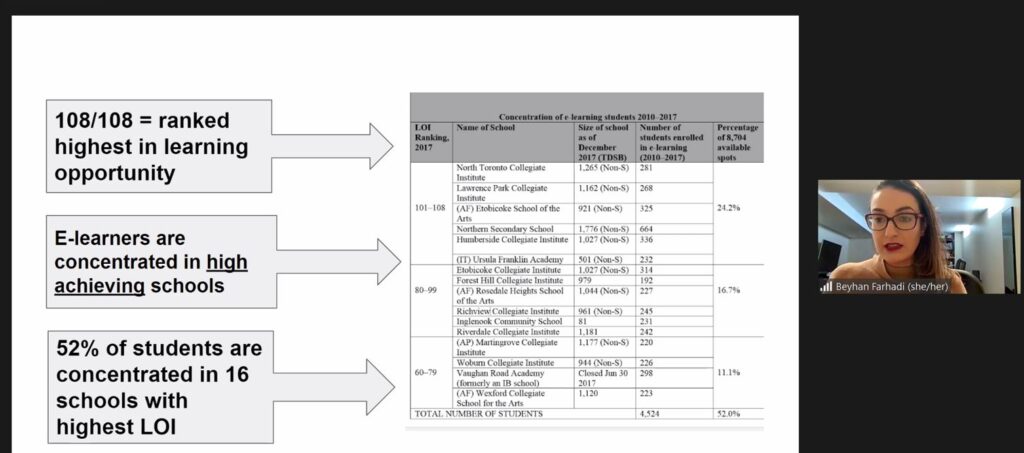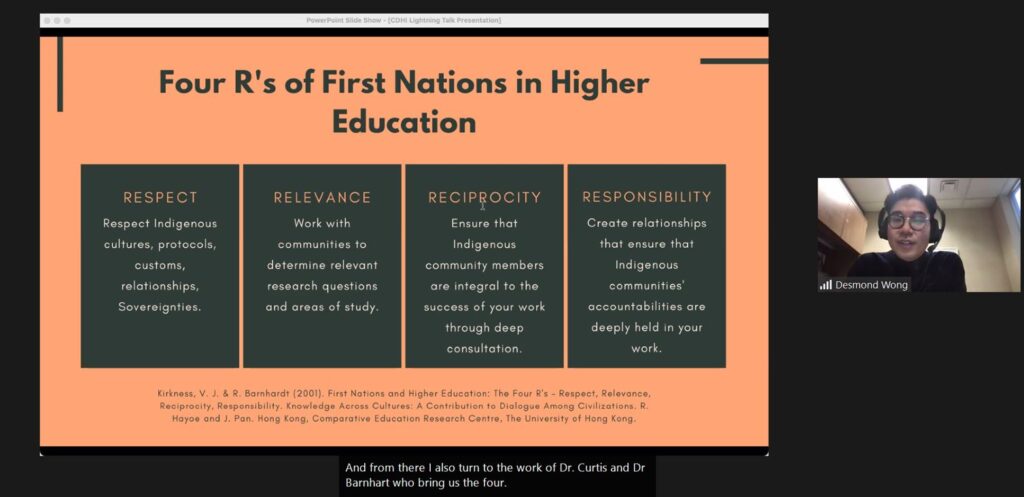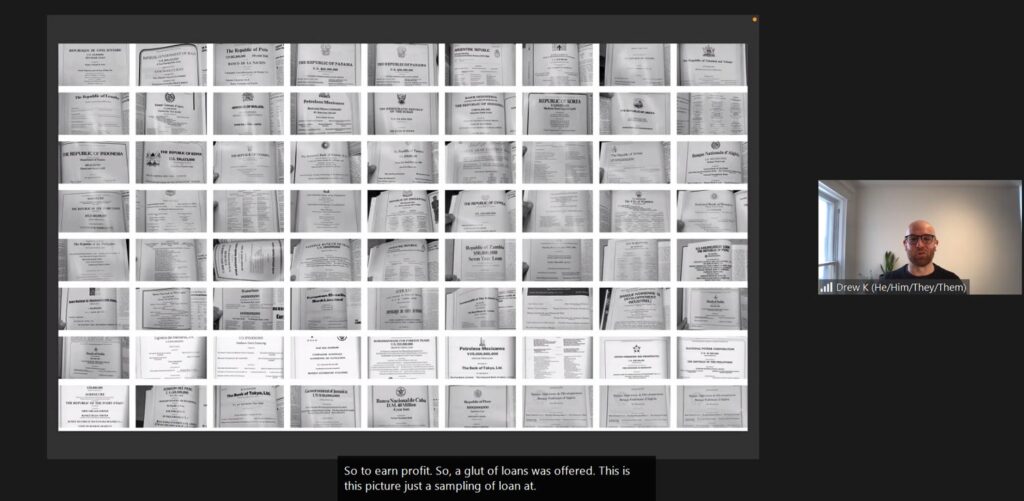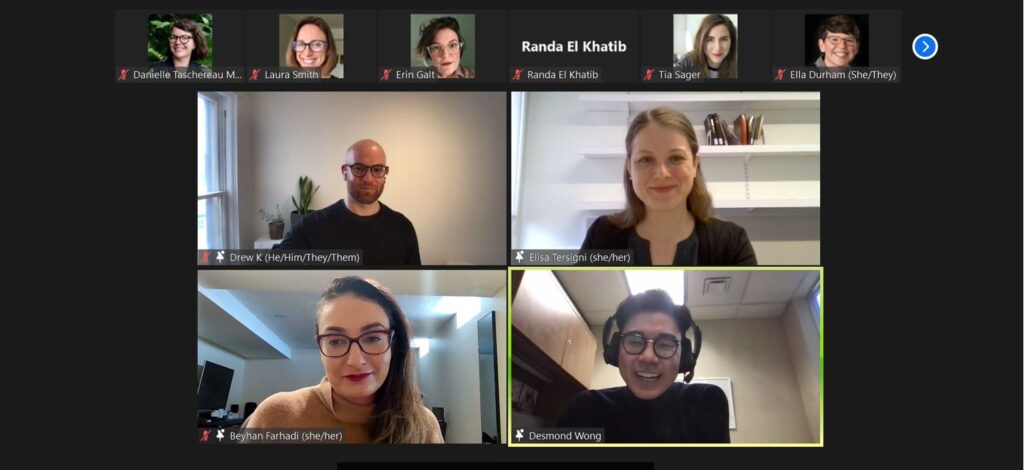By Tia Sager
At the core of critical digital humanities approaches are the ever-present and increasingly pressing issues of power and inequality. Critical DH research seeks to expose these dynamics and to consider ways in which the digital realm creates (and participates in) the creation of inequality. The fifth CDHI Lightning Lunch on February 9, 2022, examined the inverse relationship between power and inequality and its implications for the future of digital humanities research. All three speakers highlighted the ways in which their respective research on education, data sovereignty, and sovereign debt addresses systems of power and relationships to inequality. By drawing on common themes such as activism, self-awareness, and the role of social media, the speakers offered their own perspectives for mitigating inequality in academic research and reframing the power dynamic between the researcher and the communities that they serve.
Dr. Beyhan Farhadi (Postdoctoral Visitor, Faculty of Education, York University) opened the discussion with her research on “Politics of Access in Online Education.” Dr. Farhadi specializes in e-Learning strategies and her work uses ethnographic methods to study the social impact of online education. By conducting interviews with students, teachers, administrators, and parents, as well as attending asynchronous classes, Dr. Farhadi’s research showed that e-Learning disproportionately privileges those with knowledge of the system and access to resources, which tended to be wealthier, non-racialized, and ‘gifted’ students. Her research brought up a number of issues concerning surveillance, social relations and subjectivity in the online learning environment.

The next speaker, Desmond Wong (Outreach Librarian, OISE, University of Toronto) spoke about his research on “Indigenous Data Sovereignty” and the need for Indigenous Peoples to govern, participate and control their own data and data created for them. Wong defined Indigenous data as ‘anything that is generated by Indigenous Peoples,’ and raised the importance of full participation and reciprocity in sensitive research involving indigenous communities. Wong mentioned that the term ‘research’ has historically brought up negative connotations in indigenous communities, as academic research and involvement with these communities has often proven to be extractive and materialistic. Wong brought up the research of two indigenous scholars, Verna J. Kirkness and Ray Barnhardt (2001), who define the four Rs: Respect, Relevance, Reciprocity, and Responsibility, as a starting point towards decolonizing future teaching and research practices.

The final speaker was Drew K (PhD Candidate, University of Toronto and inaugural CDHI graduate fellow), whose project “Vulture Capitalism” explores how examining sovereign debt can shed light on power dynamics and inequalities in the global market. Drew’s research explores novel ways to mine data about capitalism and debt accumulated by low-income countries in order to understand the historical implications of sovereign debt. He cited digital humanist Roopika Risam, and agreed with her argument that data centralization is a significant part of creating data empires. By creating a public facing data archive, Drew argued that it would be possible to understand capitalism’s impact on countries that have suffered the effects of sovereign debt.

All three talks discussed the various ways in which inequality occurs in the digital realm and suggested actionable ways in which inequalities can be exposed and accounted for in research. All three scholars are concerned with pressing current issues, and they brought up the importance of public-facing and collaborative research with the communities that they seek to work with. A common theme that emerged through all three talks was the increasing corporate control over public information and rights such as education and data. Dr. Farhadi highlighted the various ways in which education is becoming increasingly corporately controlled, and how this will continue to disproportionately affect already marginalized and vulnerable student populations. Wong also raised the issue of control with regards to data generated by and for Indigenous Peoples, and the need for indigenous self-determination and sovereignty over their own data. Drew similarly brought up the problem of corporate control over sovereign debt and data, which leads to data empires that further marginalize and exert undue control over vulnerable economies.

Similarly, a question was raised about the speakers’ relationship between their research and activism. Dr. Farhadi brought up the importance of social media for activism and the creation of productive relationships with local communities. She argued that trust can be fostered through the online community and that social media can be a powerful tool for mobilizing knowledge and providing connections, while acknowledging that tension also exists in the online sphere.
Wong underlined the tension between himself as a researcher representing the institution he works for while also representing the people and communities that he works with. He argued that this power dynamic needs to be acknowledged and that self-awareness is the key towards accountability in collaboration. Drew added that researchers and activists often have a tense relationship with identity, as projected identities can allow certain people to access spaces that would be otherwise off-limits or restricted. To this, Dr. Farhadi responded that her own identity as a teacher shaped her current research, and that a separation needed to occur between her two identities as teacher and researcher in order for her to move forward with her project and to give the people that she was interviewing the space to express themselves. The speakers recognized that sensitive research that seeks to question the relationship between power and inequality needs to make silences or absences visible in order to expose this dynamic. All three talks provided a strong argument for the importance of collaboration and acknowledgement of power and inequality in future digital humanities research, which Wong summarized eloquently with the statement that ‘neutrality is itself a political stance.’
Tia Sager is a PhD candidate in the Department of Art History and an inaugural CDHI graduate fellow at the University of Toronto. Her dissertation, entitled “The Poetics and Politics of Space: A Regional Analysis of the Cretan Postpalatial Built Environment” and supervised by Prof. Carl Knappett (FAS), explores the built environments of Late Bronze Age Crete by means of 3D modelling.
